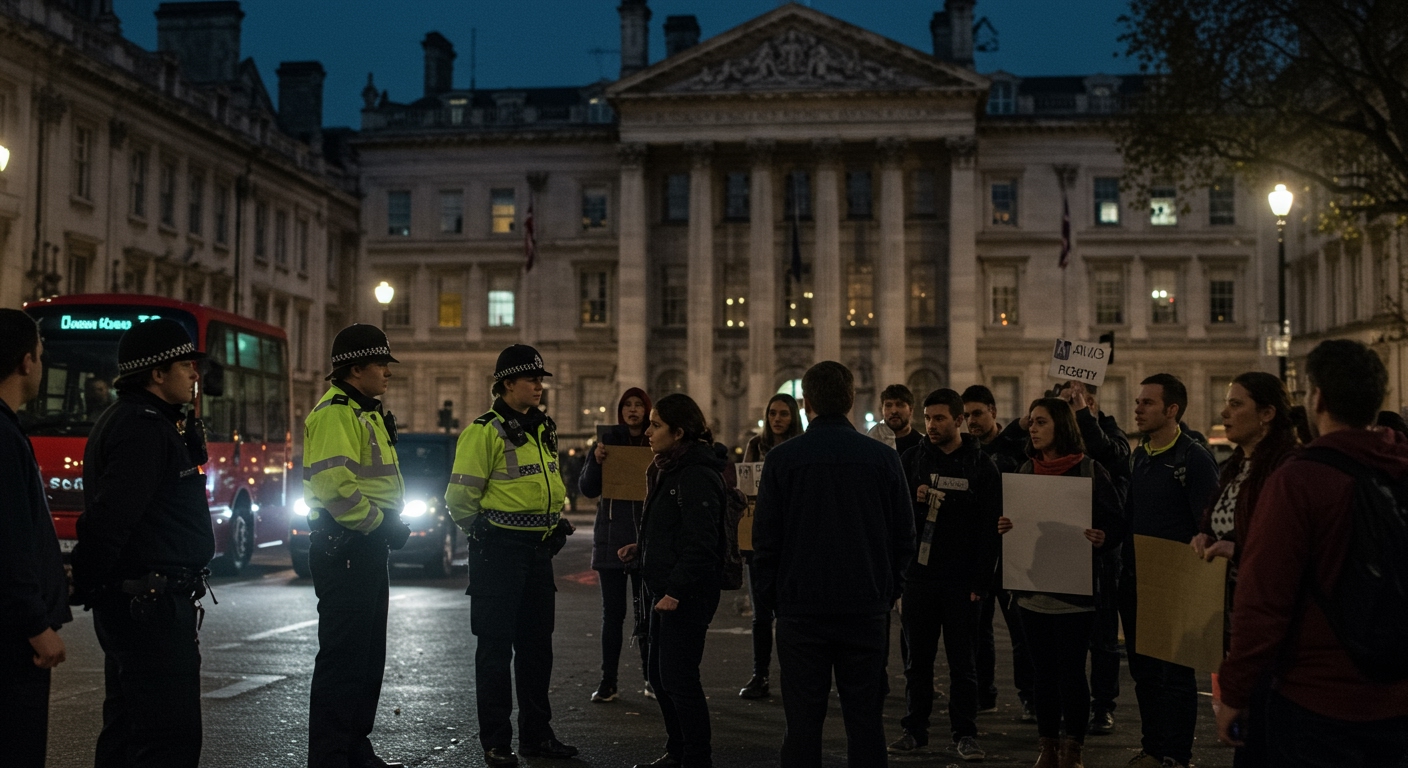London, UK – The United Kingdom government announced on Monday, June 23, 2025, its formal intention to proscribe the campaign organization Palestine Action under the nation’s anti-terrorism legislation. This significant step, pending the required parliamentary approval, would classify the group as a terrorist entity, rendering membership a criminal offense punishable by severe penalties, potentially aligning its legal status with groups such as Hamas, al-Qaeda, and ISIS.
Government Justification and Legal Framework
The announcement, made by Home Secretary [Insert appropriate government official title/name if known, otherwise use Home Secretary], follows a period of heightened activity by activists targeting defense and technology companies in the UK with alleged links to Israel. Under the Terrorism Act 2000, the Home Secretary has the power to proscribe an organization if they believe it is concerned in terrorism. This can include committing or participating in acts of terrorism, preparing for terrorism, promoting or encouraging terrorism, or being otherwise concerned in terrorism.
A group is considered “concerned in terrorism” if its activities fall within this scope. Proscription makes it a criminal offense for a person to belong to, or profess to belong to, a proscribed organization. It is also illegal to invite support for, or display support for, a proscribed group, for example, by displaying an article in public in a way that arouses reasonable suspicion that the individual is a member or supporter of the organization.
Potential Consequences of Proscription
The legal ramifications of a proscription order against Palestine Action would be substantial. Individuals found guilty of breaching the ban could face a maximum prison sentence of up to 14 years. Furthermore, assets belonging to the organization would be liable for seizure as terrorist property. This places a heavy legal burden on anyone associated with the group, significantly restricting their ability to operate openly or recruit members.
By placing Palestine Action on the list of proscribed organizations alongside groups like Hamas, al-Qaeda, and ISIS, the British government signals its view that the group’s activities pose a significant threat to national security and public safety, warranting the highest level of legal response available under anti-terrorism laws.
Recent Incidents Precipitating the Ban
The government’s decision appears to be a direct response to several recent high-profile actions attributed to activists associated with Palestine Action. Among the key incidents cited was the damage inflicted upon two UK military planes. While the specific location and type of aircraft were not detailed in the announcement, the incident underscored concerns about the potential for disruption and harm caused by activist methods.
Adding to the pressure on the government was a protest held in Trafalgar Square, located in central London, on June 23, 2025. During this demonstration, members associated with Palestine Action reportedly clashed with police officers, leading to arrests and further scrutiny of the group’s tactics. Such confrontations in public spaces raise concerns about public order and the safety of both protestors and law enforcement.
Palestine Action: Background and Tactics
Palestine Action describes itself as a direct-action network aiming to shut down arms companies complicit in the occupation of Palestine. The group has gained prominence for its tactics, which often involve targeting the premises of defense contractors and technology firms through vandalism, occupation, and disruption.
Their actions have included spraying red paint symbolising blood, damaging property, and occupying buildings or factory roofs. While the group maintains that their actions are a legitimate form of protest against perceived injustices, authorities have increasingly viewed these tactics as criminal and disruptive, potentially crossing the line into activities that threaten security and public order.
Parliamentary Approval and Future Steps
The proposed ban is not immediately in effect. According to British law, a proscription order must be approved by Parliament. This involves a debate and vote in both the House of Commons and the House of Lords. While government-proposed proscriptions typically pass due to the governing party’s majority, the process allows for parliamentary scrutiny and debate on the merits and implications of the ban.
Should Parliament approve the measure, Palestine Action would officially join the list of banned terrorist organizations in the UK. This would empower law enforcement agencies with significant new powers to tackle the group’s activities, including surveillance, arrests for membership, and the dismantling of its operational infrastructure within the country.
Implications for Protest and Activism
The potential proscription of Palestine Action is likely to ignite debate regarding the boundaries between legitimate protest and activities deemed threatening to national security. Civil liberties groups and some political figures may raise concerns about the implications for freedom of expression and the right to protest in the UK.
Conversely, the government and security services argue that certain forms of activism, particularly those involving property destruction and confrontations with law enforcement, can cross into unlawful and potentially harmful territory, justifying measures under anti-terrorism legislation to protect the public and critical infrastructure.
The announcement on Monday, June 23, 2025, marks a significant escalation in the UK government’s approach to certain forms of protest and activism related to the Israeli-Palestinian conflict, signalling a firm stance against groups whose methods are perceived as transcending peaceful demonstration and entering the realm of activities warranting classification under stringent anti-terrorism laws.





